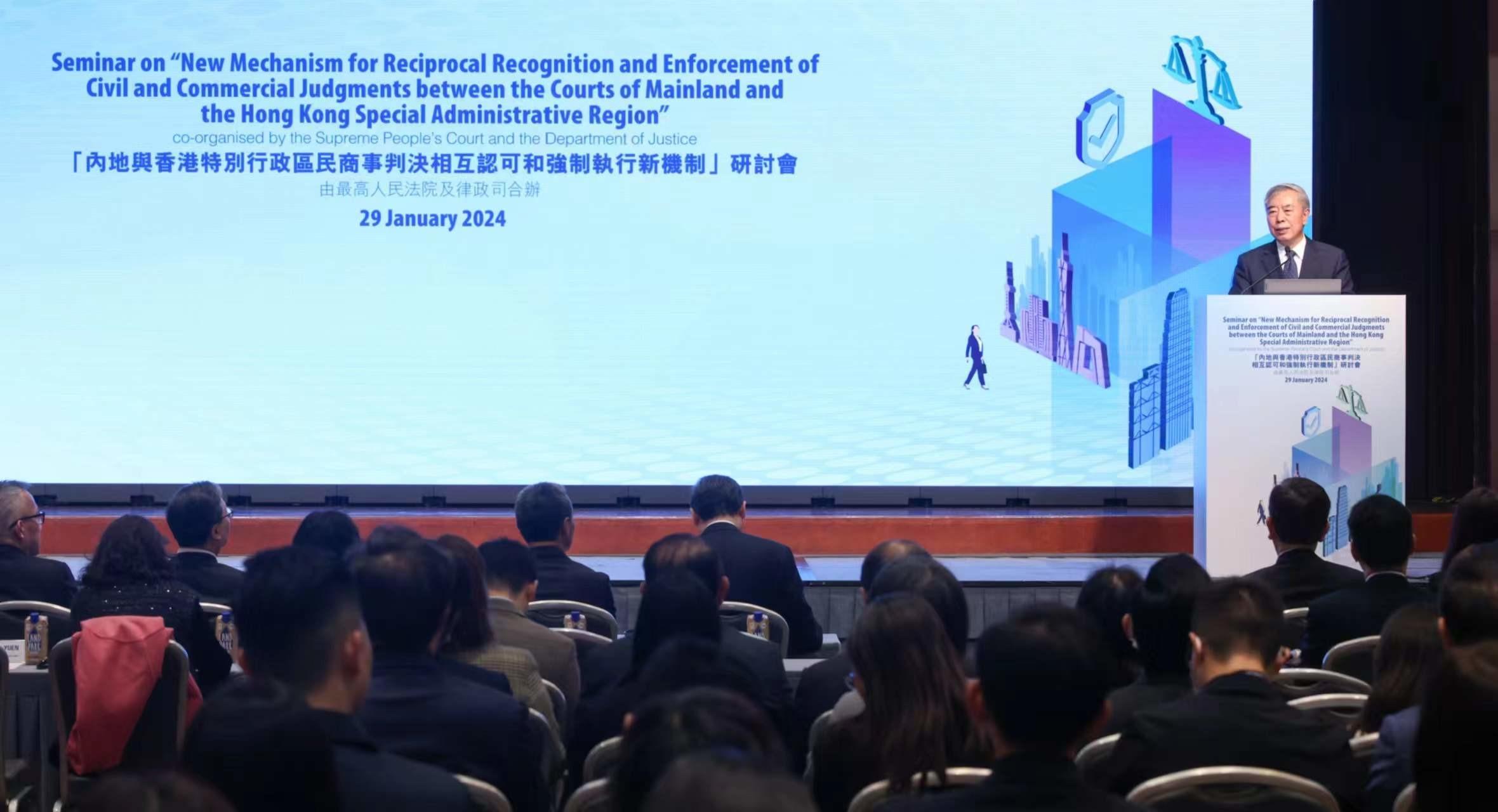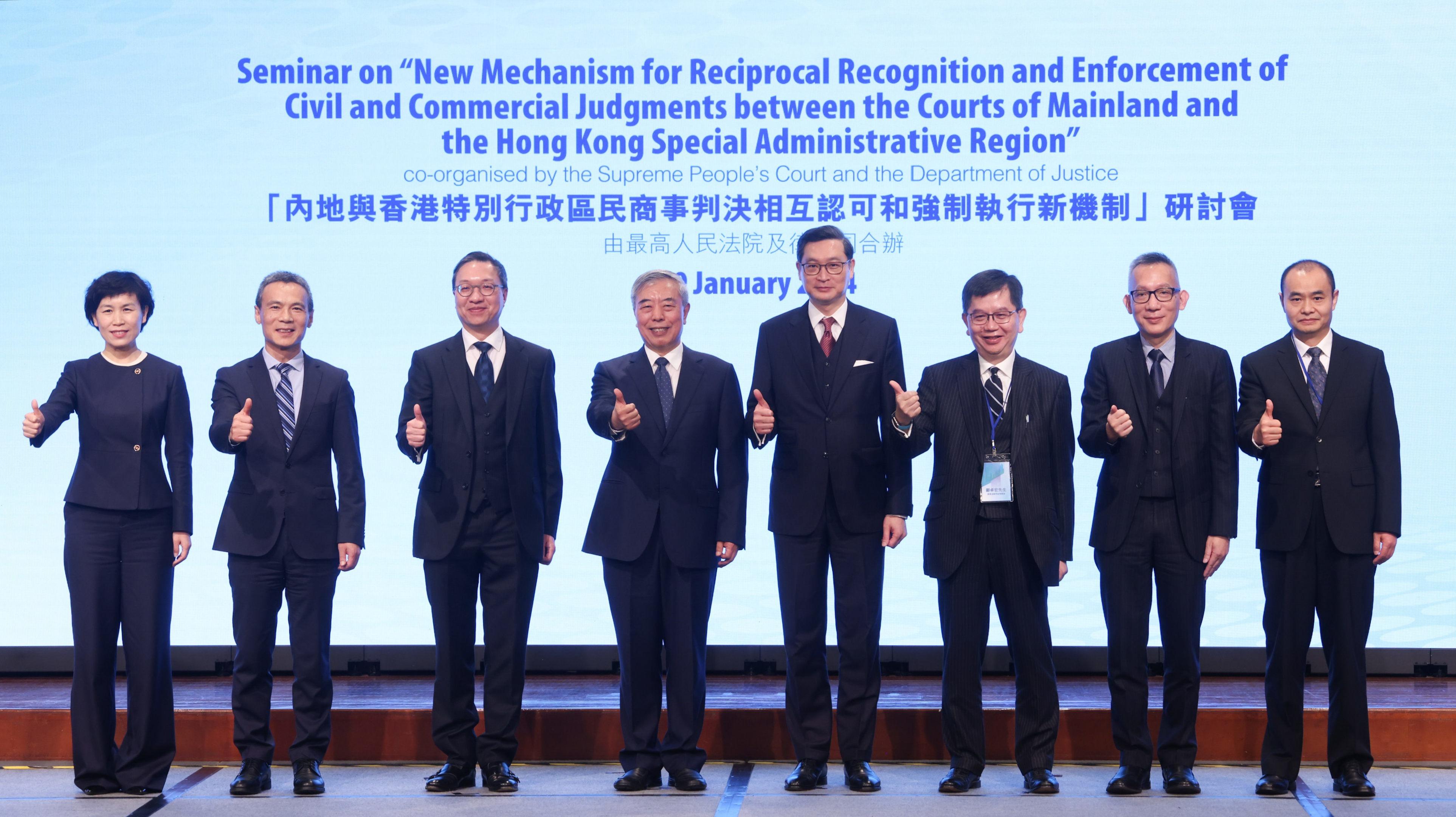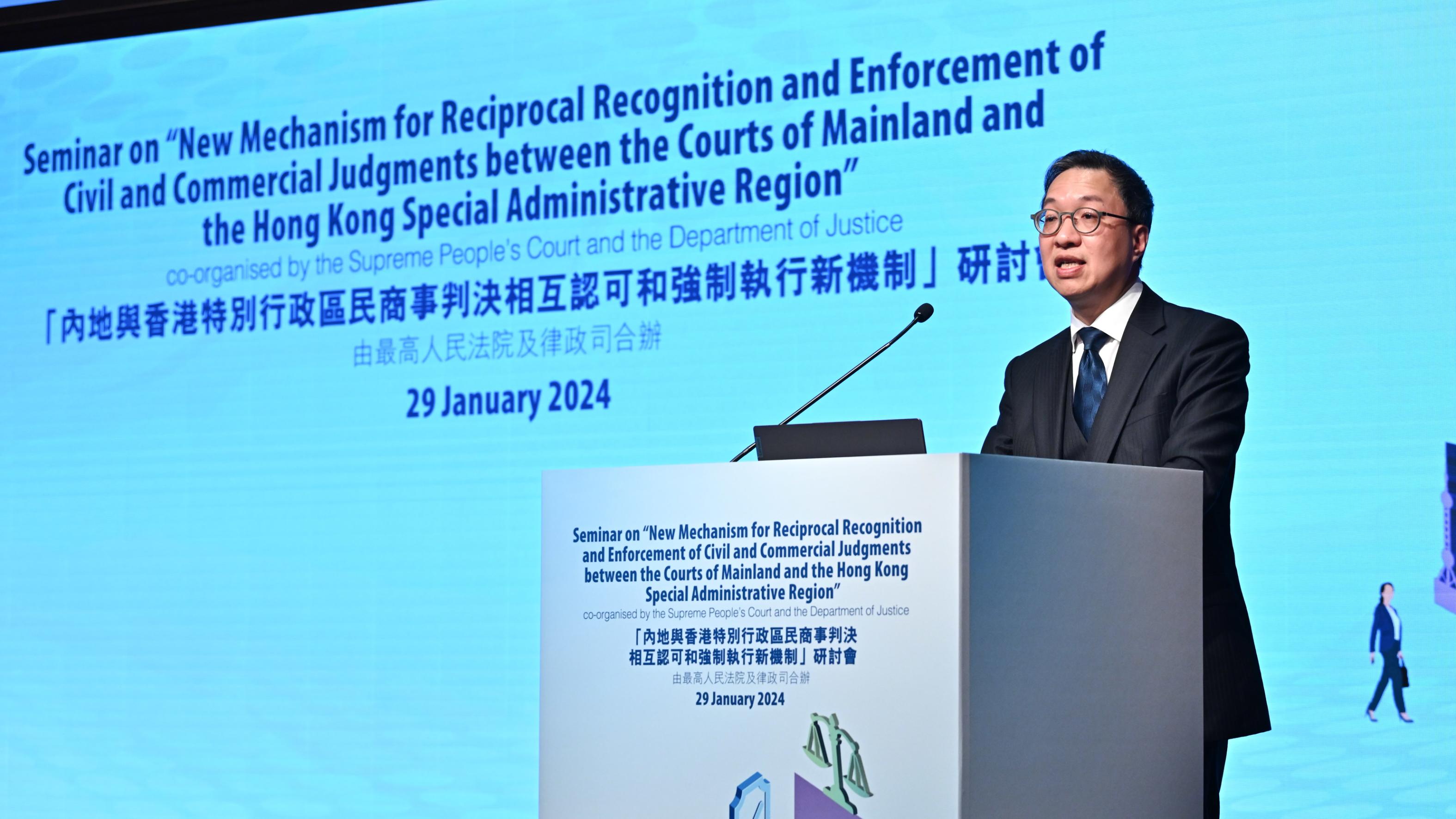 Yang Wanming, Vice-president of the Supreme People's Court, speaks at the seminar on "New Mechanism for Reciprocal Recognition and Enforcement of Civil and Commercial Judgments between the Courts of Mainland and the Hong Kong Special Administrative Region " at the Hong Kong Convention and Exhibition Centre in Wan Chai on Jan 29, 2024. (CALVIN NG / CHINA DAILY)
Yang Wanming, Vice-president of the Supreme People's Court, speaks at the seminar on "New Mechanism for Reciprocal Recognition and Enforcement of Civil and Commercial Judgments between the Courts of Mainland and the Hong Kong Special Administrative Region " at the Hong Kong Convention and Exhibition Centre in Wan Chai on Jan 29, 2024. (CALVIN NG / CHINA DAILY)
The Hong Kong Special Administrative Region and the Chinese mainland implemented reciprocal recognition and enforcement each other's judgments in civil and commercial court cases from Monday, which, high-ranking legal officials from both sides agreed, will greatly boost the city’s standing as an international legal hub.
The Arrangement on Reciprocal Recognition and Enforcement of Judgments in Civil and Commercial Matters by the Courts of the Mainland and of the HKSAR — one of nine arrangements so far regarding mutual legal assistance in civil and commercial matters on both sides of the boundary — came into force on Monday. The arrangement, concluded in 2019 by the Supreme People's Court and Hong Kong’s Department of Justice, ensures creditors do not have to file for separate litigations of the same dispute.
However, under the arrangement, the judgments of courts on the mainland will not automatically be applicable in Hong Kong, and vice versa, and assets relating to the case will not automatically be confiscated by the other side. Whether or not to apply the judgment on the other side of the boundary is a decision for the creditor to initiate, provided he or she has prevailed in the court proceedings.
Hong Kong Justice Secretary Paul Lam Ting-kwok called the arrangement a “milestone”, saying it would help solve civil and commercial disputes involving cross-border elements and benefit investors and businesses, especially those from overseas
In a high-level seminar on the new arrangement on Monday, Vice-president of the Supreme People's Court Yang Wanming said that after implementation of the new arrangement, which covers intellectual property — usually excluded from similar international covenants — judgments of more than 90 percent of civil and commercial cases between the mainland and Hong Kong will be mutually recognized and enforced. This achieves the maximum-level of mutual recognition and enforcement within one country, Yang said.
ALSO READ: Legal leaders: National security vital for HK's biz environment
Noting that so far nine mutual legal assistance arrangements have been signed by the mainland and Hong Kong, Yang said that full coverage of mutual legal assistance regarding civil and commercial issues has been achieved. The "one country, two systems" principle has also been continuously enriched and developed within the judicial field, Yang said.
Yang said he believes that a sophisticated and convenient reciprocal recognition mechanism between Hong Kong and the mainland will encourage overseas businesspeople and investors to choose Hong Kong courts to resolve cases involving mainland assets. The mechanism will also strengthen Hong Kong's role in helping mainland enterprises to tap into the global market.
 Yang Wanming (fourth left), Vice-president of the Supreme People's Court; Paul Lam Ting-kwok (third left), Secretary for Justice of the Hong Kong Special Administrative Region government; and other guests pose for a group photo at the seminar on "New Mechanism for Reciprocal Recognition and Enforcement of Civil and Commercial Judgments between the Courts of Mainland and the Hong Kong Special Administrative Region " at the Hong Kong Convention and Exhibition Centre in Wan Chai on Jan 29, 2024. (CALVIN NG / CHINA DAILY)
Yang Wanming (fourth left), Vice-president of the Supreme People's Court; Paul Lam Ting-kwok (third left), Secretary for Justice of the Hong Kong Special Administrative Region government; and other guests pose for a group photo at the seminar on "New Mechanism for Reciprocal Recognition and Enforcement of Civil and Commercial Judgments between the Courts of Mainland and the Hong Kong Special Administrative Region " at the Hong Kong Convention and Exhibition Centre in Wan Chai on Jan 29, 2024. (CALVIN NG / CHINA DAILY)
The new arrangement relieves people from having to go to the trouble of initiating litigations of the same disputes in two different jurisdictions, Yang said.
ALSO READ: NSL: HK to deal with overseas lawyers' role 'case-by-case' basis
At the same event, Hong Kong Justice Secretary Paul Lam Ting-kwok called the arrangement a “milestone”, saying it would help solve civil and commercial disputes involving cross-border elements and benefit investors and businesses, especially those from overseas.
He believes that the arrangement will enhance Hong Kong's status as an international legal service and dispute resolution services center, and will also inspire confidence in investors and businesses to explore investment and opportunities on the mainland.
Si Yanli, deputy director general of the Research Office of the SPC, said that the new arrangement was formulated by teams of experts from both sides of the boundary over a period of two years.
The arrangement is designed to serve the interests of residents in both regions, and fully demonstrates a mutual respect and willingness to seek common ground while observing the differences between the two sides.
 Hong Kong Justice Secretary Paul Lam Ting-kwok speaks at the seminar on "New Mechanism for Reciprocal Recognition and Enforcement of Civil and Commercial Judgments between the Courts of Mainland and the Hong Kong Special Administrative Region" co-organized by the Supreme People's Court and the Department of Justice on Jan 29, 2024 in the Hong Kong SAR. (PHOTO / HKSAR GOVERNMENT)
Hong Kong Justice Secretary Paul Lam Ting-kwok speaks at the seminar on "New Mechanism for Reciprocal Recognition and Enforcement of Civil and Commercial Judgments between the Courts of Mainland and the Hong Kong Special Administrative Region" co-organized by the Supreme People's Court and the Department of Justice on Jan 29, 2024 in the Hong Kong SAR. (PHOTO / HKSAR GOVERNMENT)
Si also revealed that a judicial and legal standing interfacing platform within the Guangdong–Hong Kong–Macao Greater Bay Area, which Hong Kong Chief Executive John Lee Ka-chiu's referred to in his 2023 Policy Address, has commenced construction following joint discussions between the DoJ and the SPC.
According to Si, the platform is expected to be completed soon. Aimed at stepping up efforts to establish and interface with the mainland, the standing interfacing platform is expected to facilitate research and practical work on judicial and legal matters relating to the GBA so as to address issues arising from the differences in the two legal systems.
Si said she hopes that Hong Kong will continuously deepen its integration with mainland's judicial and legal rules, achieving closer judicial connections within the country. Simultaneously, Hong Kong should continue to leverage its important advantage of having connections with the world, serving the country's high-level opening-up globally.


